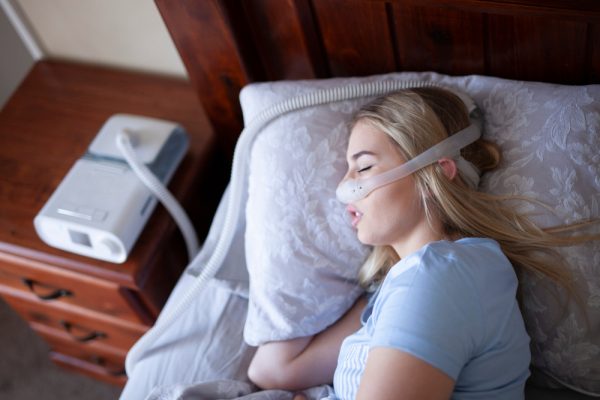The Links Between Sleep Apnea and Mental Health
Understanding the potential comorbidities and shared symptoms between mental health issues and sleep disorders is crucial when seeking professional care for sleep apnea symptoms. At Birth and Fletcher Orthodontics, Fort Worth, TX sleep dentist Dr. Sheila Birth explains the intricate relationship between sleep apnea and mental health.
Comorbidity and Shared Symptoms
Comorbidity refers to the occurrence of two or more disorders simultaneously in the same person. Sleep apnea and mental health conditions often coexist, making it challenging to determine the underlying cause of specific symptoms. Furthermore, the interaction between sleep apnea and mental health disorders can worsen all conditions.
Some of the ways sleep apnea can worsen mental health disorders include the following:
- Poor Sleep Quality: Sleep apnea disrupts sleep, leading to poor sleep quality, which can cause depressed mood, increased stress, personality changes, and higher anxiety.
- Brain Chemistry: A decrease in the neurotransmitter serotonin is associated with both sleep apnea and depression. Selective serotonin reuptake inhibitors (SSRIs), a type of depression medication, maybe a good treatment option for sleep apnea, particularly for those with epilepsy.
- Sexual Dysfunction: Sexual dysfunction is a possible symptom of sleep apnea. It can significantly interfere with your sense of satisfaction, security, and mental well-being, and it has been linked to infertility in men.
- Psychological Distress: The mental distress of untreated sleep apnea is linked to severe psychological distress, anxiety, depression, and suicidal thoughts.
- Psychiatric Comorbidity: Sleep apnea has been associated with psychiatric pathology, and psychiatric comorbidity in sleep apnea may affect patient quality of life.
- Comorbidity With PTSD: Sleep apnea and post-traumatic stress disorder (PTSD) are often comorbid, with implications for disease severity and treatment outcomes.


Mental Health Disorders Comorbid with Sleep Apnea
There are several mental health disorders commonly comorbid with sleep apnea, including:
- Depression: A study conducted for the Journal of Neurosciences in Rural Practice demonstrates a significant overlap between depression and rates of OSA. Symptoms shared between depression and sleep apnea include fatigue, daytime sleepiness, poor concentration, irritability, and weight gain.
- Anxiety and PTSD: Sleep apnea is also associated with anxiety and post-traumatic stress disorder (PTSD). For instance, a 2020 study published in Psychiatry Advisor found that people with anxiety were five times more likely to experience a lack of sleep or other sleep disorders.


- Bipolar Disorder and Schizophrenia: Sleep apnea is not uncommon in individuals with bipolar disorder and schizophrenia. A meta-analysis for the Journal of Affective Disorders found that over 15 percent of participants with schizophrenia had obstructive sleep apnea. And a study conducted for the PrimaryCare Companion for CNS Disorders found that over 16 percent of participants with bipolar disorder had OSA. Symptoms shared between these conditions and sleep apnea include weight gain, insomnia, depression, irritability, impaired decision-making, and loss of interest.
- Attention-Deficit/Hyperactivity Disorder (ADHD): Sleep apnea in children is often misdiagnosed as ADHD, leading to confusion and hardship for both children and parents. Proper diagnosis and treatment are essential to differentiate between sleep apnea and ADHD.
Treating Sleep Apnea for Better Mental Health
Treating sleep apnea can help manage symptoms of mental health issues and improve overall well-being. Alongside medication and therapy, sleep apnea treatments such as CPAP alternatives and lifestyle changes can effectively manage symptoms of sleep apnea and enhance mental health outcomes. Here are some details on how these approaches can be beneficial:
Continuous Positive Airway Pressure (CPAP) Therapy
CPAP therapy stands as the most effective treatment for sleep apnea, with far-reaching implications for mental health and well-being. By employing a specialized machine that delivers a consistent flow of air through a mask, CPAP therapy ensures an open airway during sleep.
CPAP not only prevents interruptions in breathing but also exhibits a remarkable ability to alleviate symptoms associated with sleep apnea. By enhancing sleep quality, CPAP therapy emerges as a powerful tool in combating mental illness, boasting compelling benefits such as diminished daytime sleepiness, improved mood, and enhanced cognitive function.




CPAP Alternatives
In cases where CPAP therapy proves challenging, patients need not lose hope. A range of alternative treatments exists, each with the potential to bring relief and enhance mental health outcomes.
- Oral appliances present a viable solution by repositioning the jaw or tongue to maintain an open airway. By effectively addressing the root cause of sleep apnea, these devices pave the way for improved mental well-being.
- Positional therapy offers another avenue for combating sleep apnea and its detrimental impact on mental health. Using specific devices or techniques, patients can adopt positions during sleep that minimize airway obstruction, leading to enhanced overall well-being.
- Surgery represents a potential option for those who have exhausted other avenues of treatment. This route may be considered when previous interventions have proven ineffective, offering renewed hope for better sleep and improved mental health.
Lifestyle Changes
- Maintaining a Healthy Weight through regular exercise and a balanced diet emerges as a crucial factor in reducing the severity of sleep apnea symptoms. Beyond physical health benefits, weight management holds promise for alleviating mental health challenges associated with sleep apnea.
- Steering Clear of Alcohol and Sedatives is highly recommended, as these substances relax the muscles in the airway, exacerbating sleep apnea symptoms. By doing so, individuals can safeguard their mental well-being and experience improved sleep patterns.
- Establishing a Consistent Sleep Schedule and cultivating a sleep-friendly environment can significantly contribute to enhancing sleep quality and bolstering mental health. Prioritizing restful sleep through intentional routines and optimal surroundings empowers patients to reap the mental health rewards.
- Effectively Managing Stress is paramount in the pursuit of optimal mental well-being. Engaging in relaxation techniques such as meditation or deep breathing exercises can provide invaluable support, promoting better sleep and positively impacting mental health outcomes.
Frequently Asked Questions
Is sleep apnea a mental illness?
Can sleep apnea worsen mental health conditions?
Can sleep apnea contribute to cognitive decline and memory problems?
Can sleep apnea affect creativity and problem-solving abilities?
Call & Learn How Sleep Apnea Treatment May Improve Mental Health
While treating sleep apnea can’t cure mental illnesses like schizophrenia or bipolar disorder, a good night’s rest can often make these symptoms easier to manage and drastically improve your quality of life and your life expectancy. For these reasons, seeking help from a trained professional like Dr. Birth is vital.
If you suspect you may have sleep apnea, contact our office in Fort Worth, TX, to schedule a consultation with our sleep dentist, Dr. Birth. Dial (817) 502-9103 or submit the contact form at the bottom of the page today. We serve patients from Fort Worth and surrounding areas such as River Oaks, Arlington, & Westover Hills, TX. With sleep apnea solutions from Dr. Birth, you can get the sleep you need to change your mental health for the better.
